- Home
- Departments
- Emergency Response
- Office of the Fire Marshal
- Fire Safety Tips
Fire Safety Tips
- Chimney & Barbecue Hazards
- The Escape Route
- Electrical Fire Hazards
- Fire Extinguishers
- Matches & Cigarettes
- Smoke Detectors
- Other Fire Safety Tips
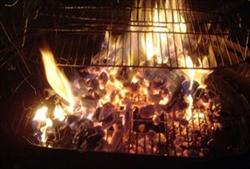 Tips
Tips
- Consider installing a spark arrestor on your chimney. They are relatively inexpensive. An approved arrestor will prevent sparks and other burning material from escaping and starting a fire on your roof, your trees, your bushes, or your neighbor's property.
- If there is uncleared land surrounding your property, trim back brush at least 100 feet from your home. Keep tree branches at least 10 feet from your chimney.
- Keep barbecue grills away from any and all flammable materials. Trees, shrubs, and even your house could catch on fire from your grill.
- Store unused starter fluid and charcoal away from the grill. Keep all highly flammable materials in a locked, fireproof cabinetsuch as:
- Charcoal
- Paints
- Solvents
- Starter fluid
- Varnishes
- Never use gasoline as a cleaning solvent, and never use flammable materials in an enclosed area.
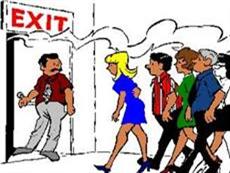 Tips
Tips
- Sleep with the bedroom doors shut. House fires develop and spread rapidly. Toxic smoke can fill the house in two or three minutes. Closed doors can give you extra seconds.
- Establish a well-planned escape route with the entire family
- Hold practice fire drills until all family members are thoroughly familiar with the plan.
- Have at least two exits planned in case one is blocked.
- Install rope ladders by upstairs windows
- Establish a meeting place across the street, at a neighbor's home, etc. This will enable you to make sure everyone is out of the house and accounted for.
- In case of fire, act quickly but cautiously. Feel the door, if it's hot, don't open.
- Hot, toxic smoke rises. Get down and crawl where the air is better to breathe.
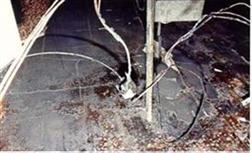 Tips
Tips
- Do not overload electrical sockets!
- If you have an older home, have the wiring checked to make sure it meets current building codes.
- Check all appliances and extension cords for frayed or exposed wires. Open or damaged wires start a number of home fires.
- Clean and service heating systems and furnaces annually. Neglect can lead to poor ventilation or deteriorating wires and both can cause fires. Also, make sure your system has an emergency shut-off switch!
- Misused space heaters start fires fast. They should never be used as a primary source of heat. Do not leave them in doorways or stairways. Make sure they are nowhere near combustible materials such as upholstery and drapes. Do not add fuel to a portable heater that is still on or hot. The fuel could "explode" into flames.
- On/off switches can fail, leaving the appliance on. Unplug heat-producing appliances that are not in use, such as:
- Electric frying pans
- Irons
- Kettles
- Space heaters
- Toasters
- Use only appliances listed by Underwriter Laboratories (UL) or the Canadian Standards Association (CSA). They are tested for safety.
- Turn off appliances when not in use.
- Always use the proper fuses in your home. Never use pennies, wires, or fuses of higher amperage than required to replace burned-out fuses.
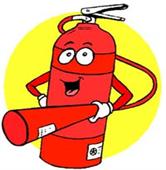 Tips
Tips
Extinguishers come in a variety of sizes and modules. Look for one that has been approved, tested, and labeled by Factory Mutual Research or Underwriters Laboratories. They are labeled by class according to the type of fire they extinguish:
- Class A: Ordinary Combustibles
- Class B: Flammable Liquids:
- Fat
- Gasoline
- Grease
- Oil
- Oil Paints
- Paint Thinner
- Class C: Electrical Equipment:
- Appliance
- Motors
- Power tools
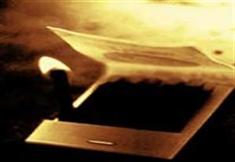 Tips
Tips
- Never smoke in bed. This is a major cause of house fires!
- Never smoke or light matches near flammable materials.
- Teach children the danger of playing with matches. They could seriously injure themselves and cause severe property loss
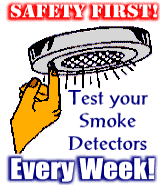 Tips
Tips
- Smoke detectors are crucial to your safety. Most fires occur at night while people are sleeping. Toxic gases from a fire can numb your senses, disorient you, and kill you. Buy and carefully maintain a quality smoke detector. Don't wait until it's too late!
- For maximum effectiveness, install heat and smoke detectors that can be monitored by an Underwriter Laboratories (UL) approved Central Monitoring Station.
- When using battery-operated smoke detectors, clean and test the batteries every month. Set up an annual time to change them, such as when you set your clocks forward or backward for daylight savings time.
- The 110-volt smoke detectors installed by contractors are not safe. They become completely disabled during power outages.
- Mount smoke detectors in a central location on every floor, high on the wall or ceiling. Remember... smoke rises.
- Do not install smoke detectors near doors, windows, or vents where drafts could affect their ability to detect smoke.
- Gently vacuum smoke detectors to keep them free of dust and other foreign particles.
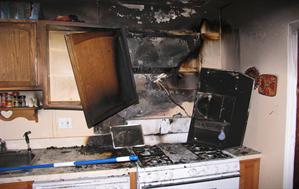 Tips
Tips
- Don't let old newspapers, magazines, or rags pile up in the basement, house, or garage. They're ideal for spreading fire.
- Always keep a fire extinguisher by the stove. Make sure it can be used on grease or electrical fires.
- Learn what causes a fire. Inspect your home to eliminate or control fire hazards.